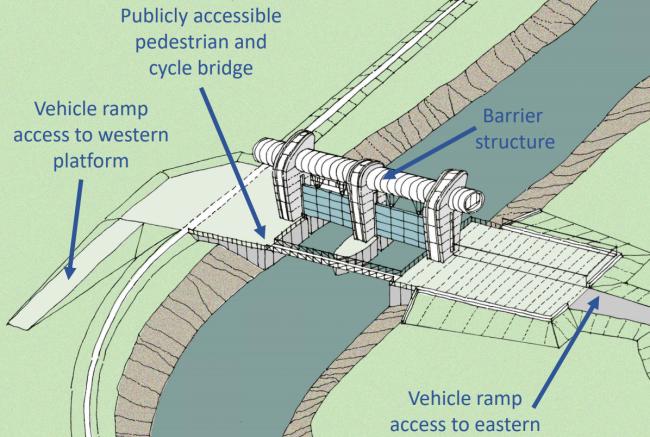SOME Chilton Trinity residents are worried a footbridge proposed as part of work on the £100m tidal barrier across the River Parrett will lead to more crime in the village.
Sedgemoor District Council (SDC) is working with the Environment Agency and the Somerset Rivers Authority to construct the barrier across the River Parrett to protect around 11,300 homes and 1,500 businesses.
Part of the work includes a new pedestrian and cycle bridge across the river, and a new riverside park with raised board-walks will be created.
However a number of Chilton Trinity residents are upset that the barrier, being built on their doorstep and causing huge disruption to the village will not leave lasting benefits.
Of particular concern is the footbridge and cycleway, with Chilton Trinity Parish Council chairman John Andrews saying: “The village has expressed its continuing opposition to the public footbridge and cycleway which they predict will lead to an increase in crime here, as petty criminals released from the custody suite in Express Park will now see this quiet village as a resource to steal a car or cash so as to get home.
“Everyone in Chilton Trinity recognises the need for the barrier but we are growing angry that our views are ignored.
"The Environment Agency and SDC refuse to offer any form of compensation for the fact that for four or more years while the barrier and the secondary defences are being built we will be subject to construction noise and other nuisance, land over which we walk for recreation will be shut off, farm operations will be disrupted and local businesses which offer angling and holiday accommodation will also be affected.

The footbridge is connected to the barrage
“SDC says £1m-£10m may be available for ‘mitigation’ but apparently none of that is to be available to Chilton Trinity.
“The most we are offered are some ‘wildlife ponds’ that will be created anyway as farmland is dug up to make the secondary defences.
“Our village hall is need of a revamp - it was built in 1953, has no heating, and I am sure money toward a new multi-purpose village hall would go some way to making residents feel they were getting some benefit from having this enormous structure built on their doorstep.”
SDC says the Bridgwater Barrier project includes substantial works to floodbanks as well as the barrier itself, meaning Chilton Trinity will benefit from reduced flood risk.
"This is especially important as sea levels rise," an SDC spokesman said.
"Indeed Chilton Trinity residents should find it easier to get house insurance now and in the future as a result of the project. This should help ensure house values do not reduce as a result of increasing flood risk.
"The project team has listened to residents’ concerns over disruption during construction. We were able to report at recent consultation events that we have established how off-road traffic routes can be used to avoid construction traffic in the village.
"We are aware of concerns of some Chilton Trinity residents over the changes a pedestrian/cycleway bridge could bring. The recent consultation events suggested to us that there is not a unanimous view.
"We believe any new path connections could be arranged so that we don’t create a major thoroughfare into Chilton Trinity to ensure footfall does not markedly increase.
"Our plans for mitigation and enhancements of the area around the barrier area are not fixed – indeed the current consultation asks for people to express preferences and ideas. We would expect those enhancements that benefit the largest number of people and hence attract most funding, would be most likely to come about."
Bridgwater area residents have less than two months to have their say on the design of the tidal barrier.
More than 150 people attended the final public consultation event, held at St Mary’s Church in Bridgwater on Friday, December 7, to put their view across.
Those who were unable to make it have until February 1, 2019 to have their say.
Under the current proposals, the barrier will span the Parrett between Chilton Trinity and the Express Park, part of which has been purchased to house the operational buildings and a possible visitors centre.
An SDC spokesman said: “When a tidal surge is forecast, the barrier gates will be closed until the high tide has passed.
“We anticipate, based on predicted tides, that the barrier will be operated around five times a year for flood protection and up to 25 times a year for maintenance. Over time the barrier may be used more as sea levels rise.”
Construction work on the barrier is expected to begin in 2022 once planning permission has been obtained from central government, with a view to the barrier being fully operational by 2024.
To download a feedback form, or for more information on the proposals, visit sedgemoor.gov.uk/bridgwaterbarrier.





Comments: Our rules
We want our comments to be a lively and valuable part of our community - a place where readers can debate and engage with the most important local issues. The ability to comment on our stories is a privilege, not a right, however, and that privilege may be withdrawn if it is abused or misused.
Please report any comments that break our rules.
Read the rules hereLast Updated:
Report this comment Cancel